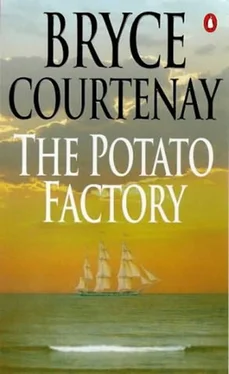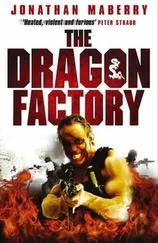Bryce Courtenay - The Potato Factory
Здесь есть возможность читать онлайн «Bryce Courtenay - The Potato Factory» весь текст электронной книги совершенно бесплатно (целиком полную версию без сокращений). В некоторых случаях можно слушать аудио, скачать через торрент в формате fb2 и присутствует краткое содержание. Жанр: Современная проза, на английском языке. Описание произведения, (предисловие) а так же отзывы посетителей доступны на портале библиотеки ЛибКат.
- Название:The Potato Factory
- Автор:
- Жанр:
- Год:неизвестен
- ISBN:нет данных
- Рейтинг книги:3 / 5. Голосов: 1
-
Избранное:Добавить в избранное
- Отзывы:
-
Ваша оценка:
- 60
- 1
- 2
- 3
- 4
- 5
The Potato Factory: краткое содержание, описание и аннотация
Предлагаем к чтению аннотацию, описание, краткое содержание или предисловие (зависит от того, что написал сам автор книги «The Potato Factory»). Если вы не нашли необходимую информацию о книге — напишите в комментариях, мы постараемся отыскать её.
The Potato Factory — читать онлайн бесплатно полную книгу (весь текст) целиком
Ниже представлен текст книги, разбитый по страницам. Система сохранения места последней прочитанной страницы, позволяет с удобством читать онлайн бесплатно книгу «The Potato Factory», без необходимости каждый раз заново искать на чём Вы остановились. Поставьте закладку, и сможете в любой момент перейти на страницу, на которой закончили чтение.
Интервал:
Закладка:
If this was intended to make the citizenry of the great metropolis sympathetic towards him, the ploy did not work. In every tavern, dance emporium, club and home London celebrated his capture and the City police took on the mantle of the heroes. It was as if they had hunted their quarry to the ends of the earth and brought him back in chains to face the full retribution of British justice. At no time was any credit accorded to Colonel Arthur. The governor of an obscure convict colony was simply not grand enough for such a prominent capture.
Though retired, Sir Jasper Waterlow travelled up to London to ascertain that it was indeed Ikey Solomon who had been returned, and he was rumoured to have visited him in Newgate to shake his hand.
This time Ikey was placed in a cell in the very centre of Newgate Prison. He was guarded twenty-four hours a day and allowed no visitors except for the barrister, Mr Phillips, whom he had briefed to represent him. He was arraigned at the Old Bailey and charged with seven additional counts of theft on top of the original charge of forging Bank of England five pound notes.
These additional charges had come about when, following Hannah's sentence, the police had observed that Ikey's home in Whitechapel was in the process of being bricked up. They had immediately served a search warrant on Abraham Reuban and thoroughly ransacked every room. They found the trapdoor under Hannah's bed and within it the false ceiling which contained a small fortune in stolen goods. When Abraham Reuban was finally permitted to brick up the windows and doors, only the safe under the pantry floor remained undiscovered.
Eleven days can make a marked difference in the appearance of a man and Ikey still had a sufficient sum to treat himself well in prison and pay for the best legal advice in England. He abandoned his hang dog demeanour and hirsute looks and ordered a new suit of clothes and linen from a tailor, though not from Abraham Reuban, who was not permitted to see him. A gentleman's barber from the Haymarket was brought in to cut his hair and to trim and shape his ragged beard. With ten days of good food in his belly Ikey was much improved in every circumstance but that of hope. When he stood in the dock at the Old Bailey to hear the reading of the indictments against him he was thought by many to be a man of handsome appearance.
The scene of the day of the trial, consequently much exaggerated by Grub Street hacks, is best described by reading from the eminently respectable Morning Post of the following day.
…shortly, after the opening of the Courts, every avenue leading to the New Court, in which the case was appointed for trial, was thronged almost to suffocation. The decided majority of the crowd seeking admittance was evidently the descendants of the patriarchs. As was but naturally expected the utmost anxiety was evidenced on the part of all those of the Jewish persuasion to catch a glimpse of the person and the features of the prisoner. At 8 a.m. the Common Sergeant took his seat on the bench and shortly afterwards Ikey was placed at the bar. In the Newgate Calendar he was described as a dealer and the age given as 45. He did not, however, appear nearly so old. During the time the indictments were read, he frequently and piercingly surveyed the persons in the body of the Court as if he were prepared to find an accuser in everyone his eyes rested upon.
Five of the eight indictments read out in court carried with them capital offences and Ikey, it was supposed, could not bring himself to hope that he might escape them all and so save his neck from the gallows. It was often enough reported that since his arrival in this country he had suffered considerable dejection of the mind, but there was no sign of this in court. When the indictments were completed and the prisoner allowed to answer them he spoke calmly and in a voice devoid of despair.
'Your honour, it is my modest hope that the jury will find me innocent and that under all circumstances His Majesty's Government will be induced to spare my life, and permit me to join my wife and family who are still residing in Van Diemen's Land.'
This little speech, short and sweet, when picked apart seems somewhat confused. It claims his innocence, then asks to be spared the rope under all circumstances so that he be allowed to go free to join his wife and family. It is most doubtful that there existed in court, or anywhere in England, a person unaware of the notorious Hannah Solomon. Yet Ikey spoke of his wife as if she were some contented colonial settler's spouse waiting patiently for her loving husband to return home having been exonerated of all crimes by a just and benign English legal system.
The overcrowded court and the mayhem in the streets outside had delayed proceedings, but Mr Phillips, Ikey's barrister, was crisp on the uptake and the first two charges, neither of which were capital offences, were dealt with in a summary manner. Ikey, who naturally denied everything, was found not guilty by the jury.
Then three of the capital charges were heard and disposed of with equal speed. Thus in the process of one morning five of the charges against Ikey were dismissed. Mr Phillips had proved himself an able defender of his celebrated client and Ikey, standing in the dock, appeared almost nonchalant. He did not evince the slightest pleasure at the 'not guilty' verdict. It was as if he had not been possessed of the smallest doubt as to the outcome of each hearing. Though it was always allowed that the first five cases were weak in point of proof, three of them were also invalidated by the ruling that a person could not be called upon to account for the possession of goods found in his custody three months after they had been stolen.
However, the noose was not yet removed from Ikey's scrawny neck. The court was adjourned to the 12th of July, when the remaining three indictments would be heard. Two of these were capital charges and the evidence available for the prosecution was most compelling. All of London was ablaze with gossip and every tavern and chop house produced any amount of boisterous speculation. Customers with not a scintilla of knowledge of the law turned into street lawyers who waxed more wise with each jug of ale or snifter of brandy. A great deal of money was laid in bets as to whether the eventual outcome would be the rope or the boat. Only the most foolishly optimistic accepted the odds of a hundred to one on Ikey's ability to beat the rap entirely.
When Ikey returned to the Old Bailey the crush of people wishing to get in was even greater than on the first occasion. A near riot occurred when the court attendants attempted to close the doors to the New Court, there being not room enough for a dormouse to squeeze into the public gallery. Ikey was brought back to the bar of the court to face the final three charges against him.
The first charge to be heard, the only one of the three that was not a capital offence, was the one brought against him by the Bank of England and involved the forgery of banknotes of five pounds denomination. Sir Reginald Cunningham, a Scot and a barrister of the highest repute, led the prosecution. He proceeded to lay out in chapter and verse the story of Abraham Van Esselyn who was in partnership and under the influence of the notorious Ikey Solomon. Finally he had shown in evidence the result produced by Ikey and his Belgian partner. Sir Reginald then asked that he might present the two fake five pound notes to the judge together with two of legitimate currency, with the further request that the jury might be allowed to examine them thereafter.
In a dramatic gesture Sir Reginald handed the judge a large magnifying glass and begged him to choose the fake from the real. While the judge examined the banknotes Sir Reginald, in a further dramatic thrust, asked the judge to examine the watermarks on all of the notes, pointing out that they were all identical in nature, the paper used being the very same as was employed by the Treasury. The great barrister paused and waited for complete silence, then he added in a stentorian voice, 'I need hardly remind this court that the theft of paper used in the manufacture of banknotes is a crime against the Crown and the Treasury and therefore punishable by death!'
Читать дальшеИнтервал:
Закладка:
Похожие книги на «The Potato Factory»
Представляем Вашему вниманию похожие книги на «The Potato Factory» списком для выбора. Мы отобрали схожую по названию и смыслу литературу в надежде предоставить читателям больше вариантов отыскать новые, интересные, ещё непрочитанные произведения.
Обсуждение, отзывы о книге «The Potato Factory» и просто собственные мнения читателей. Оставьте ваши комментарии, напишите, что Вы думаете о произведении, его смысле или главных героях. Укажите что конкретно понравилось, а что нет, и почему Вы так считаете.












